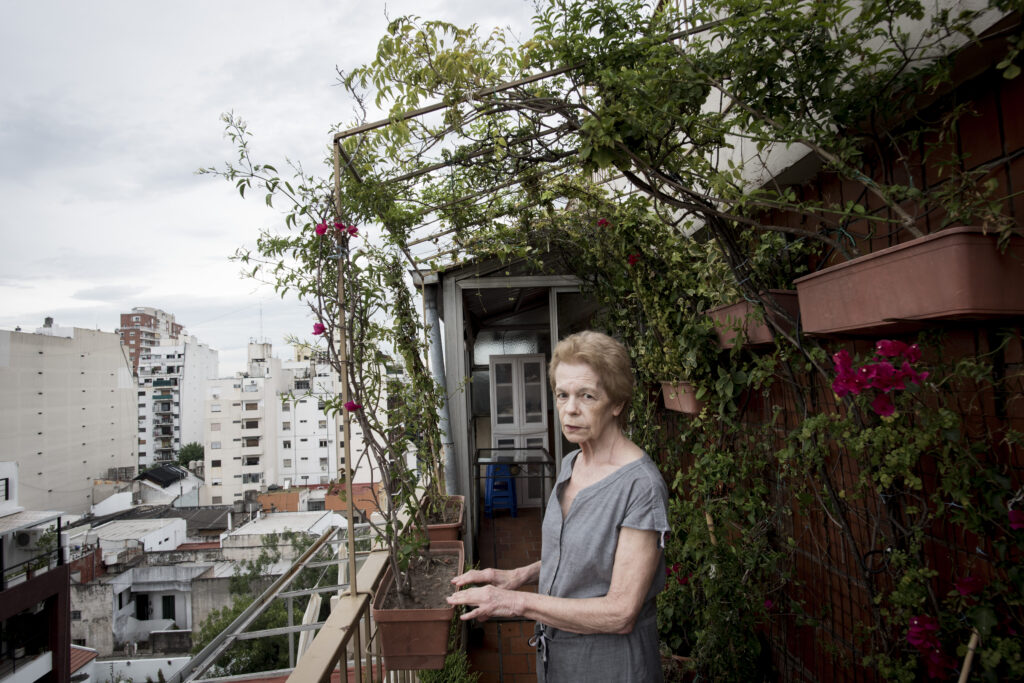
Photograph by Agustina Fernández.
Hebe Uhart had a unique way of looking—a power of observation that was streaked with humor, but which above all spoke to her tremendous curiosity. Uhart, a prolific Argentine writer of novels, short stories, and travel logs, died in 2018. “In the last years of her life, Hebe Uhart read as much fiction as nonfiction, but she preferred writing crónicas, she used to say, because she felt that what the world had to offer was more interesting than her own experience or imagination,” writes Mariana Enríquez in an introduction to a newly translated volume of these crónicas, which will be published in May by Archipelago Books. At the Review, where we published one of Uhart’s short stories posthumously in 2019, we will be publishing a series of these crónicas in the coming months, starting with one of the most personal.
About thirty years ago, I had a boyfriend who was a drunk. Back then, I was full of vague impulses and concocted impossible projects. I wanted to build a house with my own two hands; before that, there’d been another project, involving a chicken hatchery. I was never cut out for industry or manual labor. I didn’t think that alcoholism was a sickness—I believed he would be able to stop drinking once he decided to. I was working at a high school and had asked for some much-needed time off to improve my mental health, and I spent my days with my drunken boyfriend going from club to club, and from one house to the next. We paid countless visits to the most diverse assortment of people, among them an old poet and his wife who would receive guests not at their home, but in bars. Some turned their noses up at the pair, whispering that it took them a week to get from Rivadavia Avenue to Santa Fe Avenue, as they spent a full day at each bar. It was a year of great discovery for me, learning about these people and their homes, but sometimes it was boring, because drunks have a different sense of time and money. It is like living on a ship, where time is suspended, and as for my boyfriend’s friends, they were always destined for the bottle and stranded at the bar (or so they claimed) until someone could come rescue them. I used to get bored when drunk poets began counting the syllables of verses to see if they were hendecasyllabic, trochaic … it could go on for hours.
The whole time I was mixed up in all of this, nobody ever knew where I was going. I would only come home to eat and sleep—I didn’t tell my family anything. They became concerned. My mom had a cousin follow me and report back to her:
“They sleep at a different house every night. My advice—buy her an apartment.”
My mom gave me all her savings (one million pesos, the equivalent of twenty-five thousand dollars) and told me to find an apartment. So my boyfriend and I went together to choose. I would confront people and ask them questions while he hung back, watching me work. Before long we came to an old but giant apartment with a long hallway. “Look at all this space!” I said, thrilled. But there was something strange about it—the wall dividing the apartment from the one to it was very low (about ten observers looked at us from the other side). I thought: “No big deal, we can raise the wall later. With all this space, we could get new wallpaper, remodel …? Right?” He said yes to everything because being around so many people terrified him—neither of us knew how to remodel anything. As usual, he looked on fearfully, with admiration, as I confronted people. I felt strong and confident, like an executive. So I hadn’t built the chicken hatchery after all, but I had discovered an interesting hobby. Luckily, I was advised not to buy the apartment. I bought a very old two-bedroom, with a telephone and an elevator that had never been used. A piece of the ceiling had crumbled, so we put the bed in a small foyer beside the front door, a decision we’d agreed upon. The owners had sold me the apartment without cleaning it: when I swept, a cloud of dust would form. So, I told myself: “No need for sweeping. After so many years, it can’t help but stay dirty.” I had already gone back to work and was performing well, but I was tired of coming home to two or three drunks who had kept me awake the night before arguing about the poetry of Góngora or Quevedo, sleeping on the floor of one of our vacant rooms. I could never bring myself to say, “Get out of my house.”
Instead, I began to focus my energies on curing my boyfriend: I would take him to the doctor and the psychologist, and buy his vitamins for him. After much preparation, he was finally ready for his first job interview; he had agreed to everything, but it didn’t progress any further than that. He never did sober up, but I at least learned how to buy and sell apartments.
Anna Vilner’s translation of “A Memory from My Personal Life” will appear in a forthcoming collection of Hebe Uhart’s crónicas, A Question of Belonging, to be published by Archipelago Books in May 2024. The original Spanish version was collected in Uhart‘s Crónicas completas, published by Adriana Hidalgo.
from The Paris Review https://ift.tt/qhZEsac
Comments
Post a Comment